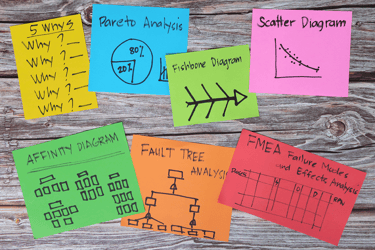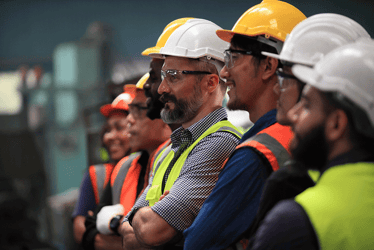The Packaging Industry's Sustainability Challenge: Why ERP Systems Are Essential for Success A straightforward guide to navigating sustainability regulations across folding carton, flexible...
How Technology Simplifies ESG Reporting for Packaging Manufacturers
In today's business environment, packaging manufacturers are under increasing pressure to demonstrate their commitment to sustainability.
As Environmental, Social, and Governance (ESG) reporting becomes a standard expectation from stakeholders, companies in the packaging industry must find efficient ways to track, manage, and report their ESG performance.
However, the process can be complex, given the diverse operations involved, from sourcing materials to production and distribution.
Fortunately, technology is transforming auditable ESG reporting for packaging manufacturers, making it easier to meet sustainability goals while maintaining efficiency and profitability. In this blog, we'll explore how specific technologies like Enterprise Resource Planning (ERP) systems, Manufacturing Execution Systems (MES), shop floor data collection, and closed-loop process control are revolutionizing ESG reporting in the packaging sector.
Contents
-
Key technologies simplifying auditable ESG reporting for packaging manufacturers
-
The future of auditable ESG reporting in packaging manufacturing
The unique ESG challenges in packaging manufacturing
Due to the packaging industry's complexity, manufacturers face unique challenges in ESG reporting. The sector is heavily scrutinized for its environmental impact, particularly in areas like waste management, energy consumption, and the use of sustainable materials. Additionally, social and governance aspects, such as labor practices and supply chain transparency, are becoming increasingly important.
Traditionally, collecting and reporting this data involved manual processes, which were time-consuming and prone to errors. However, integrating advanced technologies is changing the game, enabling more accurate, efficient, and transparent ESG reporting.
Key technologies simplifying auditable ESG reporting for packaging manufacturers
ERP systems: Centralizing ESG data management
Enterprise Resource Planning (ERP) systems are essential for packaging manufacturers looking to streamline their auditable ESG reporting. An ERP system centralizes data across various departments: sales, procurement, production, quality control, and distribution. This integration ensures that all relevant ESG data - such as energy usage, raw material sourcing, waste management, and labor practices - are captured in a single system that should be the company’s source of truth.
With an ERP system, packaging manufacturers can automate the collection and reporting of ESG data, reducing the reliance on manual processes. This minimizes the risk of errors and enhances data accuracy and consistency across the organization. ERP systems often include customizable reporting tools that allow companies to generate ESG reports in compliance with industry standards and regulatory requirements.
MES systems: Enhancing operational transparency and efficiency
Manufacturing Execution Systems (MES) play a crucial role in improving the transparency and efficiency of packaging operations. An MES provides real-time monitoring and control of manufacturing processes, capturing detailed data on production efficiency, energy consumption, waste generation, and other vital metrics relevant to ESG reporting.
For example, an MES can track the usage of raw materials and ensure that production processes are optimized to minimize waste. This data can then be fed directly into ESG reports, providing a clear picture of the company's environmental impact. Moreover, MES systems can integrate with ERP platforms, creating a seamless flow of information from the shop floor to the corporate level, further simplifying ESG data management.
Shop floor data collection: Accurate and real-time ESG insights
Shop-floor (or plant-floor) data collection is fundamental for packaging manufacturers aiming to improve their auditable ESG reporting. By collecting real-time data directly from the shop floor, manufacturers can monitor key environmental metrics, such as energy consumption, water usage, and waste output. This granular level of data helps companies identify inefficiencies and areas for improvement much faster than traditional methods.
For instance, smart sensors and IoT devices installed on the plant floor can continuously track energy use or detect leaks and emissions, providing instant alerts to operators. This real-time data collection enables proactive management, reducing environmental impact and enhancing operational efficiency. It also ensures that ESG data is accurate, up-to-date, and reflects actual conditions, allowing for more transparent and trustworthy reporting to stakeholders.
Closed-loop process control: Driving continuous improvement
Closed-loop process control technology is a game-changer for packaging manufacturers aiming to enhance their ESG performance. This technology involves using real-time data from production processes to make continuous adjustments, ensuring that manufacturing operations always operate optimally. By minimizing waste, reducing energy consumption, and improving product quality, closed-loop process control directly contributes to better ESG outcomes.
For instance, in a packaging plant, sensors can monitor critical variables like temperature, pressure, and material thickness. The system then uses this data to adjust the manufacturing process automatically, ensuring that resources are used efficiently and that waste is minimized. This continuous feedback loop improves operational efficiency and provides valuable data for ESG reporting, highlighting the company's commitment to sustainable practices.
Automated auditable ESG reporting tools: Integrating data across systems
For packaging manufacturers, the integration of ERP, MES, shop floor data collection, and closed-loop process control systems can be further enhanced with automated ESG reporting tools. These tools pull data from various sources - ERP systems for financial and supply chain data, MES systems for operational data, shop floor sensors for real-time metrics, and closed-loop control systems for process efficiency metrics - and compile it into comprehensive ESG reports.
Automated ESG reporting tools can also include dashboards and analytics features, enabling manufacturers to visualize their ESG performance in real-time. This capability allows companies to identify areas for improvement quickly, set more realistic sustainability goals, and communicate their progress to stakeholders more effectively.
How we can help with our solutions
At eProductivity Software, we understand packaging manufacturers' unique challenges in ESG reporting. Our comprehensive industry-specific solutions integrate advanced ERP and MES systems with cutting-edge shop floor data collection and closed-loop process control technology, providing a unified platform that simplifies the ESG reporting process. Our systems are designed to automate data collection, ensure real-time monitoring, and generate accurate, compliant reports with ease. By leveraging our solutions, packaging manufacturers can streamline their ESG efforts, enhance operational efficiency, reduce waste, and achieve sustainability goals. We are committed to empowering your company with the technology needed to lead in sustainability and meet the growing demands of a greener future.
The future of auditable ESG reporting in packaging manufacturing
As technology evolves, packaging manufacturers will have even more powerful tools for ESG reporting. We can expect to see further advancements in AI-driven analytics, Machine Learning (ML), IoT-based monitoring systems, and blockchain technology, all of which will enhance the accuracy, transparency, and efficiency of ESG reporting.
By adopting these technologies, packaging manufacturers can meet the growing demands for sustainability and gain a competitive edge in the market. Transparent and accurate ESG reporting builds trust with stakeholders, attracts investment, and opens up new growth opportunities.
Conclusion
Technology is transforming ESG reporting from a complex, manual task into a streamlined, automated process for packaging manufacturers. With the integration of ERP and MES systems, shop floor data collection, closed-loop process control technology, and automated reporting tools, companies can efficiently manage their ESG data and produce accurate, timely reports. These technologies simplify the reporting process and drive continuous improvement in sustainability practices, helping packaging manufacturers create a more sustainable future.
Embracing these technologies is not just about compliance; it's about positioning your company as a leader in sustainability, ensuring long-term success in an increasingly eco-conscious market.




